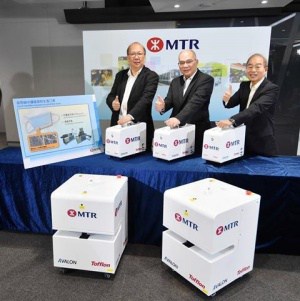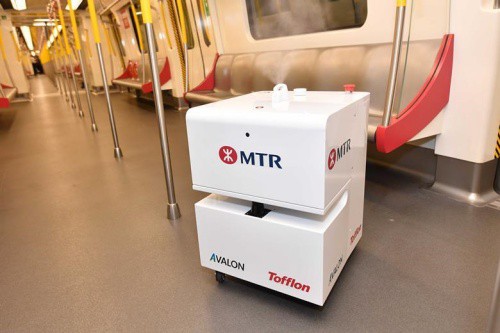The MTR Corporation has deployed a new automated “Vapourised Hydrogen Peroxide Robot” (VHP Robot) to conduct deep cleaning and decontamination in train compartments and stations in Hong Kong , further enhancing hygiene and health protection for passengers and staff under the current COVID 19 epidemic.
The VHP Robot is created from a joint project of MTR and Avalon Biomedical, a Hong Kong biotechnology company.
By automatically spraying hydrogen peroxide solution that is atomised to a specific concentration, the VHP Robot ensures that disinfectants penetrate in the small gaps that are difficult to reach during normal cleaning work. In this way, it can eliminate viruses and bacteria, including staphylococcus aureus, Escherichia coli and so on. The effectiveness of the VHP Robot has passed relevant tests and achieved the desired results.
“We fully understand our passengers’ concerns about hygiene in their travelling environment, especially amid the current COVID-19 outbreak,” said Dr Tony Lee, operations director of MTR Corporation. “While MTR has comprehensively strengthened cleaning and disinfection work in the railway network, we have also continued to actively explore feasible enhancements.”
Automated deep cleaning
When there is a need to conduct disinfection, an MTR staff can pre-set the VHP Robot to operate automatically by pre-setting the floor plan of the designated area, or remotely control the robot manually with a mobile device within a distance of 20 metres.
In general, it takes about 4 hours to complete the cleaning of an 8-car train in automatic mode. If there is a special situation, such as a passenger vomiting on a train, MTR staff will deploy the VHP Robot to perform deep cleaning on top of the regular cleaning with diluted bleach water.
Recently, the robot was dispatched to disinfect the back-of-house area at Mong Kok East Station, including staff changing rooms, staff toilets and mess room, as well as the passenger lifts at the station after an MTR employee there was diagnosed with COVID-19.
“We plan to deploy a total of 20 VHP robots for train cleaning in depots and hope this helps to ensure the comfort of passengers’ journeys by providing ever greater health protection for our colleagues and

our customers alike. We are very happy to be collaborating with Avalon and are very encouraged by the results,” said Lee.
Face mask production
Meanwhile, the collaboration between MTR and Avalon also includes the introduction of a dedicated surgical face mask manufacturing facility for MTR, which can produce masks that are capable of blocking PM 2.5 particles with nanofibre technology developed by experts of Hong Kong Polytechnic University.
The manufacturing facility has been delivered to MTR and the setting up of a clean production room is underway. Production is expected to start in the second half of this year at the earliest, and the ultimate production rate should meet the daily consumption rate of MTR staff.
“As MTR staff will wear face mask when they carry out customer-facing duties during the current epidemic, the production can help ensure its smooth operations with stable supply of face masks,” said Dr Lee.
Furthermore, MTR and Avalon are also testing the use of air filters made by nano-air filtration technology to further improve the air quality of stations.



